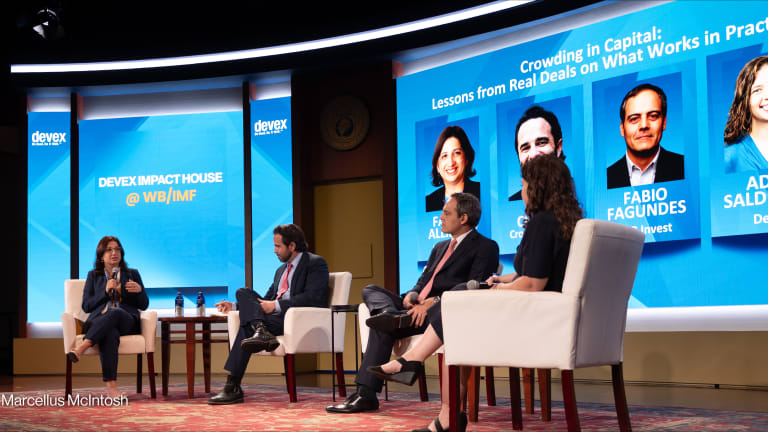
WASHINGTON — The Overseas Private Investment Corporation and Liberty Mutual Insurance announced a billion dollar co-investment platform that will invest in small- and medium-sized enterprises, a first for OPIC as it looks to try new tools and attract more institutional investors to the development finance arena.
OPIC and Liberty Mutual are each committing $500 million to invest in bank and nonbank financial institutions that will lend to SMEs in a risk-sharing structure. This is the first time OPIC has worked with a U.S.-owned insurance company to share credit risk across a global portfolio of new OPIC loans.
“We’ve seen blended finance deals be bespoke,” said OPIC Executive Vice President David Bohigian after the announcement Thursday. “This is a different structure.”
With this platform, OPIC and Liberty have negotiated upfront pricing and structuring across a range of deals that will allow the two organizations to streamline the process and avoid negotiating individual deals separately, he said.
Liberty will guarantee $25 million per transaction for deals that meet an agreed set of criteria that rely on OPIC’s due diligence processes, credit committee, and investment teams.
About $235 million in deals that would come through the risk-sharing facility are going through the investment committee process now and will likely be considered by the board next month, Bohigian said. It will likely take a few years for the full billion-dollar investment to be allocated.
Liberty Mutual decided to partner with OPIC as part of its efforts to diversify its credit insurance risk portfolio and access new markets, according to a press release.
“Liberty Mutual is fully committed to providing effective credit and political risk insurance products globally,” Peter Sprent, head of financial risk solutions at Liberty Specialty Markets, wrote in the press release.
“Partnering with public agencies like the Overseas Private Investment Corporation is an important way for us to approach this market. We benefit from OPIC’s high standards of due diligence — including environmental and worker rights safeguards — and credit monitoring.
OPIC hopes that this platform will serve as an important model as OPIC aims to expand its work with institutional investors, and is already in conversations with several other major institutional investors about similar vehicles focused on infrastructure and women’s empowerment, Bohigian said.
These types of vehicles help simplify the process, speed transaction times, mitigate risk, and give OPIC more flexibility in how it operates, he said, adding that development finance should increasingly look toward these types of deals to allow for more streamlining of blended finance transactions.








